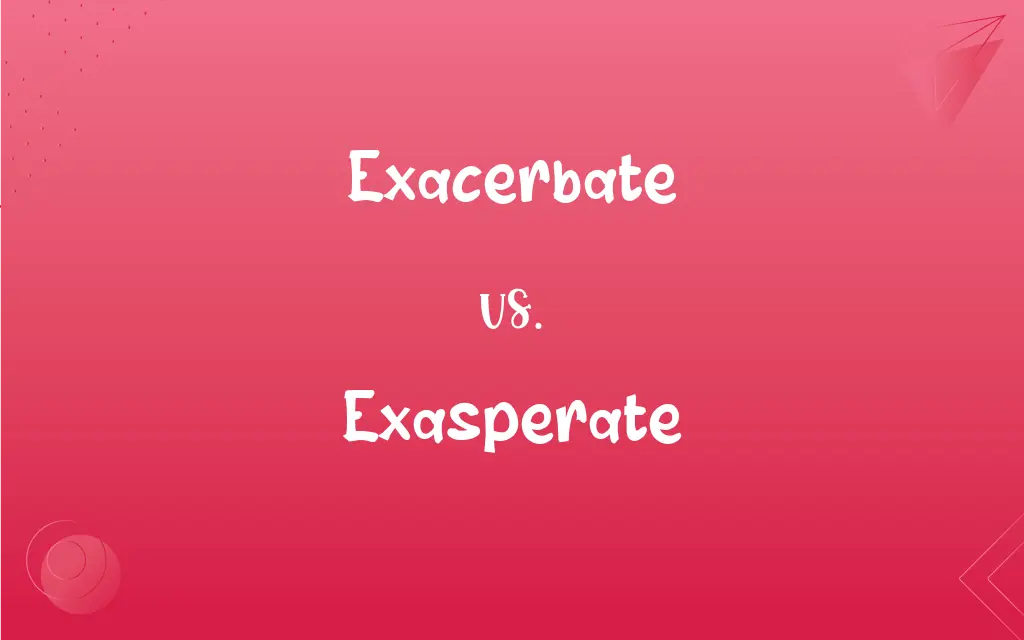Exacerbate vs. Exasperate: What's the Difference?
Edited by Harlon Moss || By Janet White || Updated on November 13, 2023
"Exacerbate" means to worsen or intensify a situation, while "exasperate" means to irritate or frustrate someone deeply.

Key Differences
"Exacerbate" is used to describe a situation that is made worse or more severe. It typically refers to an increase in the intensity or seriousness of a problem. On the other hand, "exasperate" is used to express a feeling of intense irritation or frustration towards a person or situation.
"Exacerbate" is commonly used in medical or technical contexts to describe the worsening of symptoms or conditions. In contrast, "exasperate" is often used in interpersonal or emotional contexts, describing a response to someone's actions or behavior.
While "exacerbate" has a more neutral or clinical tone, often used in a factual manner, "exasperate" carries a more emotional connotation, implying a level of personal annoyance or frustration.
Both words are verbs, but "exacerbate" is often followed by an object that refers to the situation being worsened, such as 'symptoms' or 'problems'. "Exasperate," however, is typically used with a direct object referring to a person or group being irritated.
Synonyms for "exacerbate" include aggravate and worsen. For "exasperate," synonyms are irritate and annoy. Conversely, the antonyms for "exacerbate" would be alleviate or improve, and for "exasperate," it would be appease or calm.
ADVERTISEMENT
Comparison Chart
Definition
To make a bad situation worse
To irritate or frustrate deeply
Typical Context
Medical, technical, problem escalation
Emotional, interpersonal, response to annoyance
Tone and Connotation
Neutral, clinical
Emotional, personal
Grammatical Usage
Followed by an object referring to the worsened state
Used with a direct object referring to a person
Synonyms and Antonyms
Synonyms: aggravate, worsen; Antonyms: alleviate
Synonyms: irritate, annoy; Antonyms: appease, calm
ADVERTISEMENT
Exacerbate and Exasperate Definitions
Exacerbate
To increase the severity or seriousness of a problem.
Pollution can exacerbate asthma symptoms.
Exasperate
To cause someone to feel extreme annoyance or impatience.
The slow internet connection exasperated him.
Exacerbate
To aggravate an already difficult or painful situation.
His angry comments only served to exacerbate the conflict.
Exasperate
To overwhelm with frustration or annoyance.
The complex instructions exasperated the students.
Exacerbate
To make an already bad situation even worse.
Ignoring the problem will only exacerbate it over time.
Exasperate
To provoke or incite anger or irritation in someone.
His dismissive attitude exasperated his supervisor.
Exacerbate
To intensify negative feelings or conditions.
Lack of sleep can exacerbate stress levels.
Exasperate
To irritate or frustrate someone intensely.
Her constant lateness would exasperate her colleagues.
Exacerbate
To escalate the negative aspects of a scenario.
The economic crisis was exacerbated by poor financial planning.
Exasperate
To drive someone into a state of irritation or anger.
The continuous noise exasperated the residents.
Exacerbate
To increase the severity, violence, or bitterness of; aggravate
A speech that exacerbated racial tensions.
A heavy rainfall that exacerbated the flood problems.
Exasperate
To make very angry or impatient; annoy greatly.
Exacerbate
(transitive) To make worse (a problem, bad situation, negative feeling, etc.); aggravate.
The proposed shutdown would exacerbate unemployment problems.
Exasperate
To increase the gravity or intensity of
"a scene ... that exasperates his rose fever and makes him sneeze" (Samuel Beckett).
Exacerbate
To render more violent or bitter; to irritate; to exasperate; to imbitter, as passions or disease.
Exasperate
To tax the patience of; irk, frustrate, vex, provoke, annoy; to make angry.
Exacerbate
Make worse;
This drug aggravates the pain
Exasperate
(obsolete) exasperated; embittered.
Exacerbate
Exasperate or irritate
Exasperate
Exasperated; imbittered.
Like swallows which the exasperate dying yearSets spinning.
Exasperate
To irritate in a high degree; to provoke; to enrage; to excite or to inflame the anger of; as, to exasperate a person or his feelings.
To exsasperate them against the king of France.
Exasperate
To make grievous, or more grievous or malignant; to aggravate; to imbitter; as, to exasperate enmity.
To exasperate the ways of death.
Exasperate
Exasperate or irritate
Exasperate
Make furious
Exasperate
Make worse;
This drug aggravates the pain
FAQs
Are "exasperate" and "exasperated" interchangeable?
No, "exasperate" is a verb, while "exasperated" is an adjective describing a state of being.
Can a person be "exacerbated"?
Not directly. It's situations or conditions that are exacerbated, not individuals.
Does "exasperate" have a positive connotation?
No, it implies deep irritation or frustration.
Is "exasperate" used in medical contexts?
Rarely, it's mostly used to describe feelings of frustration.
Can "exacerbate" be used to describe feelings?
No, "exacerbate" typically describes situations, not emotions.
Are there any contexts where these words could be confused?
Unlikely, as they apply to different situations: one to worsening conditions, the other to irritation.
Is "exasperate" always negative?
Yes, it describes a negative emotional response.
Is "exacerbate" a common word in everyday language?
It's more common in formal or technical contexts.
Can "exasperate" be used in a passive form?
Yes, e.g., "He was exasperated by the delays."
Can "exacerbate" and "exasperate" be synonyms?
No, they have different meanings and contexts.
Are there any other forms of "exacerbate"?
Yes, "exacerbation" is the noun form.
Can "exacerbate" refer to improvement?
No, it exclusively means to make worse.
Does "exacerbate" have an opposite?
Yes, words like "alleviate" or "mitigate" are its opposites.
Can "exasperate" be used humorously?
It can, often to exaggerate someone's frustration for comic effect.
Can "exasperate" be used as a noun?
No, its noun form is "exasperation."
Does "exacerbate" imply intent?
No, it describes an effect, regardless of intent.
Can "exasperate" describe a group's feelings?
Yes, it can refer to the frustration of an individual or a group.
Can "exasperate" be used in a positive context?
Generally, no, as it describes negative feelings.
Can "exasperate" mean to make worse?
No, it specifically refers to causing irritation or frustration.
Is "exacerbate" used in casual conversation?
It's more formal and may not be common in casual speech.
About Author
Written by
Janet WhiteJanet White has been an esteemed writer and blogger for Difference Wiki. Holding a Master's degree in Science and Medical Journalism from the prestigious Boston University, she has consistently demonstrated her expertise and passion for her field. When she's not immersed in her work, Janet relishes her time exercising, delving into a good book, and cherishing moments with friends and family.
Edited by
Harlon MossHarlon is a seasoned quality moderator and accomplished content writer for Difference Wiki. An alumnus of the prestigious University of California, he earned his degree in Computer Science. Leveraging his academic background, Harlon brings a meticulous and informed perspective to his work, ensuring content accuracy and excellence.































































